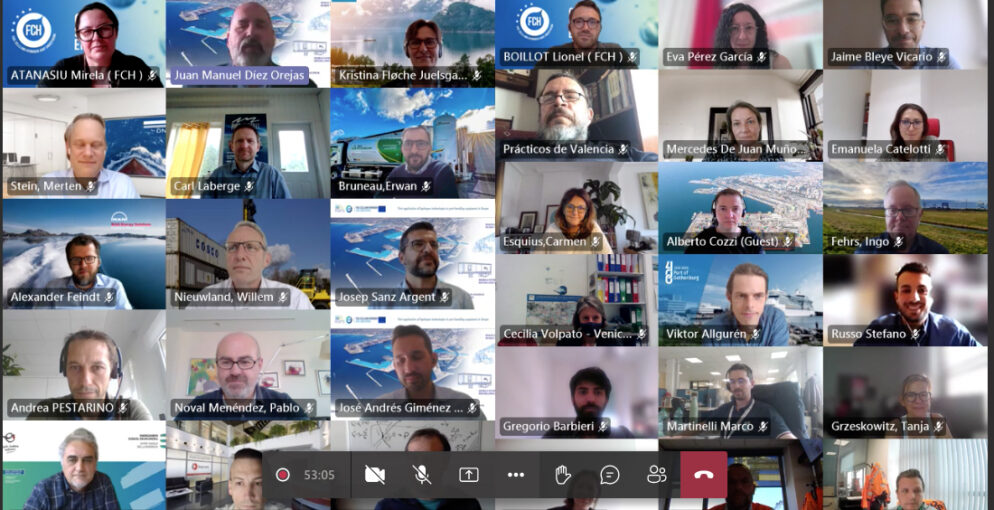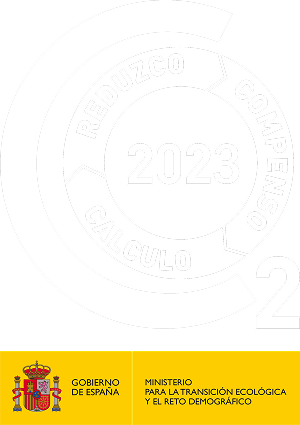Valencia – 19.05.21. This afternoon, the 2nd meeting of the H2PORTS hydrogen project stakeholders group was held in virtual format with a great success of attendance, reaching 70 participants.
The objective of this group is to promote the exchange of knowledge, experiences and good practices on the use of hydrogen in the maritime-port sector, being one of its main activities the organisation of thematic meetings in which the state of the technology is presented and inspiring results of real projects developed in the sector are shared.
On this occasion, the potential use of hydrogen as a marine fuel was chosen as the central theme of the meeting, and four prestigious speakers were selected. Firstly, Merten Stein, from the classification society DNV, addressed the complex change that the marine fuel sector is undergoing due to the ambitious objectives of decarbonisation of the sector. Erwan Bruneau from Carburos metálicos (Air Products Group) then gave a presentation on hydrogen logistics and the complexities involved from the supplier’s point of view. Alexander Feindt, from Man Energy Solutions, spoke about combustion engine technologies for using hydrogen as a fuel, taking into account both pure hydrogen and ammonia engines and the associated fuel tanks. Finally, Kristina Fløche Juelsgaard, from Ballard Power Systems Europe, detailed the use of fuel cells and hydrogen for port and maritime applications and presented end-user experience in real projects.
It is also worth mentioning the participation in this meeting of Mirela Atanasiu, Head of Unit of the FCHJU (Fuel Cells and Hydrogen Joint Undertaking of the European Commission) who presented to the attendees the new tender that the FCHJU has recently published with the aim of addressing issues on the logistics and technology of hydrogen use in ports and industrial coastal areas.
Once the round of presentations was over, an interactive debate took place, moderated by José Andrés Giménez, Director of Port Logistics of Fundación Valenciaport, in which the participants had the opportunity to ask questions, not only to the speakers but also to the other members of the stakeholder group, about the benefits of hydrogen use by companies in the sector; the vision of shipping companies about the most attractive fuels to comply with the regulation or the barriers encountered by ports when establishing hydrogen supply points.
Finally, the Head of Strategic Planning and Innovation of the Port Authority of Valencia, Juan Manuel Díez closed the meeting by stressing the importance of the issues discussed during the session and convening the members to a new meeting to be held in November of this year.
The H2PORTS stakeholder group, created in January last year, now has more than 60 member organisations from Europe, Canada and the United States.
H2PORTS
The European project “H2Ports – Implementing Fuel Cells and Hydrogen Technologies in Ports” is an initiative coordinated by Fundación Valenciaport in close collaboration with the Port Authority of Valencia and financed by the Fuel Cell and Hydrogen Joint Undertaking (FCH JU) programme. Its main objective is to test and validate hydrogen technologies on port machinery that allow to have applicable and real solutions without affecting the performance and safety of port operations and producing zero local emissions.
The H2Ports project will entail a total investment of 4 million euros and involves, in addition to Fundación Valenciaport and the Port Authority of Valencia, the Centro Nacional del Hidrógeno, and the private companies MSC Terminal Valencia, Grupo Grimaldi, Hyster-Yale, Atena Distretto Alta Tecnologia Energia Ambiente, Ballard Power Systems Europe and Enagás.
Thanks to this initiative, the Port of Valencia will be the first port in Europe to incorporate hydrogen technologies to reduce the environmental impact of its operations.
Fuel Cells and Hydrogen Joint undertaking (FCH JU):
This public-private partnership is the European body promoting the adoption of hydrogen as a low-emission alternative and is supported through the European Union’s Horizon 2020 Research and Innovation programmes, Hydrogen Europe Research and Hydrogen Europe.


